
Guests
- Mairead Maguirewas awarded the 1976 Nobel Peace Prize for her actions to help end the deep ethnic and political conflict in her native Northern Ireland. She shared the award with Betty Williams. They helped start Peace People, a movement committed to building a just and peaceful society in Northern Ireland.
We broadcast live from The Hague, where over 1,000 female peace activists gathered from around the world 100 years ago this week to call for an end to war. The extraordinary meeting, known as the International Congress of Women, took place as World War I raged across the globe. Today, as wars rage on in Afghanistan, Iraq, Syria, Libya, Yemen and other countries, women from around the world have gathered again in The Hague to call for peace and to mark the 100th anniversary of the Women’s International League for Peace and Freedom. In a Democracy Now! exclusive, we speak with three Nobel Peace Prize laureates. “Their agenda is to end militarism and war, and to build peace and international law and human rights and democracy,” says our first guest, Mairead Maguire, who was awarded the 1976 Nobel Peace Prize at the age of 32 for her actions to help end the deep ethnic and political conflict in her native Northern Ireland. She shared the award with Betty Williams. They helped start Peace People, a movement committed to building a just and peaceful society in Northern Ireland. At the time, Maguire was the youngest recipient of the peace prize. She is the author of the book “The Vision of Peace: Faith and Hope in Northern Ireland.”
Transcript
AMY GOODMAN: One hundred years ago this week, over a thousand women peace activists gathered from around the world to meet here at The Hague to call for an end to war. The extraordinary meeting, known as the International Congress of Women, took place as World War I raged across the globe. The gathering was organized by a Dutch suffragist named Dr. Aletta Jacobs. The event took place in the Netherlands because of its neutral position during World War I. At the event, Dr. Jacobs said, quote, “Those of us who have convened this Congress of Women assembled to protest against war and to suggest steps which may lead to warfare becoming an impossibility,” she said. Two future Nobel Peace Prize winners took part in the U.S. delegation: Jane Addams, the co-founder of Hull House in Chicago, and the sociologist Emily Greene Balch. The event marked the formation of the Women’s International League for Peace and Freedom, known as WILPF. Well, today, as wars rage on in Afghanistan, in Iraq, in Syria, Libya, Yemen and other countries, women from around the world have gathered again here in The Hague to call for peace and to mark the 100th anniversary of the Women’s International League for Peace and Freedom.
In a Democracy Now! exclusive today at The Hague, we’re joined by three Nobel Peace laureates. Jody Williams is with us. She won the Nobel Peace Prize in 1997 for her work with the International Campaign to Ban Landmines. In 2003, she helped launch the Campaign to Stop Killer Robots. Her memoir is called My Name is Jody Williams: A Vermont Girl’s Winding Path to the Nobel Peace Prize.
Leymah Gbowee is also with us. She received the Nobel Peace Prize in 2011 for her work in leading a women’s peace movement that brought an end to the Second Liberian Civil War in 2003. Gbowee shared the prize with fellow Liberian Ellen Johnson Sirleaf, now president, and Yemeni native Tawakkul Karman. Gbowee and Sirleaf became the second and third African women to win the prize, preceded by the late Wangari Maathai of Kenya. She is the founder and president of Gbowee Peace Foundation Africa based in Liberia. She’s the author of the book, Mighty Be Our Powers: How Sisterhood, Prayer, and Sex Changed a Nation at War.
And Mairead Maguire is with us. She was awarded the 1976 Nobel Peace Prize at the age of 32 for her actions to help end the deep ethnic and political conflict in her native Northern Ireland. She shared the award with Betty Williams. They helped start Peace People, a movement committed to building a just and peaceful society in Northern Ireland. At the time, Mairead was the youngest recipient of the peace prize. She’s the author of the book, The Vision of Peace: Faith and Hope in Northern Ireland.
Leymah, Jody and Mairead are also part of the Nobel Women’s Initiative, which was formed in 2006 to support women’s groups around the world in campaigning for justice, peace and equality.
We welcome you all to Democracy Now! Mairead, you may have been the youngest recipient at the time of the Nobel Peace Prize, but you were the first to win the peace prize of the three of you here. Talk about the significance of this meeting today. Once again, about a thousand women have gathered here at The Hague—we’re broadcasting from the World Forum—to take on the issue of war, in these very violent times. What does this group—what can groups like this accomplish?
MAIREAD MAGUIRE: Well, I think first goal of groups like this, over a thousand women and many men from many countries, and their agenda is to end militarism and war, and to build peace and international law and human rights and democracy. And, you know, that’s not a new agenda, because 100 years ago, when they gathered here at The Hague and when Alfred Nobel was set up, and with Bertha von Suttner, way over a hundred years ago, their agenda was—
AMY GOODMAN: And her name isn’t very well known, let me say, Bertha von Suttner, who she was and how she inspired—how she inspired Alfred Nobel.
MAIREAD MAGUIRE: And isn’t that incredible? She was the first Nobel woman, and over a hundred years. And her agenda with Alfred Nobel was fraternity amongst the nations, building nations cooperating together to solve the problems. The second was abolish armies and militarism and war, because they’re not working. And the third one was to, through dialogue, through negotiation, through solving the problems, through listening to each other, and build international law and human rights. And, I mean, that’s the way forward for the world today.
AMY GOODMAN: How did you use this philosophy in Ireland?
MAIREAD MAGUIRE: Because in Northern Ireland, we had a very deep ethnic, political problem, and it was very complex. But at the base of it all was fear, inequality and injustice. But we tried to solve it through militarism, paramilitarism, and it was getting worse and worse. And in '76, my sister's three children were killed. The message that we came out—and thousands and thousands—
AMY GOODMAN: How were they killed?
MAIREAD MAGUIRE: They were killed in an awful tragedy between the British army and an active service unit of the Irish Republican Army. And one of my younger sisters, Anne, she went walking with her four children, and three of them were killed. She was dangerously ill.
AMY GOODMAN: British soldiers shot them?
MAIREAD MAGUIRE: Yes, and the IRA. She wasn’t expected to live, and subsequently died of her injuries. But that brought out people in the thousands with a very message: No to violence, yes to peace, yes to dialogue. We can solve our problems without violence and killing each other. And that was a very important message.

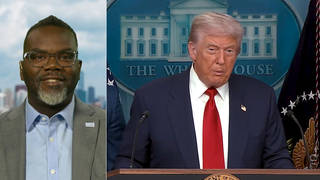

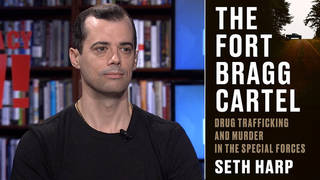
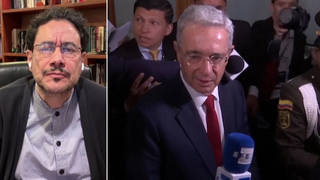





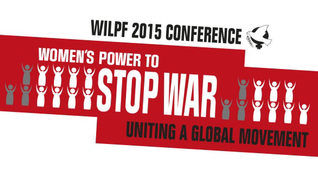
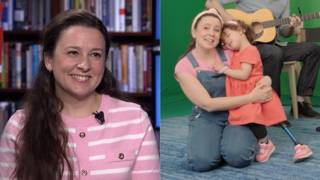
Media Options